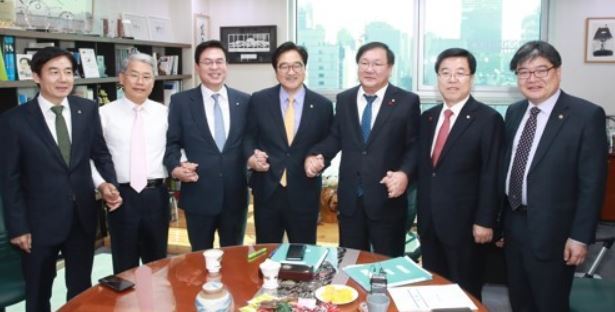Rival parties agreed Thursday to delay submitting the government's 2018 spending plan for a parliamentary vote by a day, amid a deadlock in their negotiations over several sticking points, including proposed outlays for job creation.
Under the agreement among National Assembly Speaker Chung Sye-kyun and the floor leaders of the three major parties, the bill has to be automatically submitted to a parliamentary plenary session by Saturday noon.
In accordance with the law governing legislative procedures, the bill has to be sent to the plenary session by Friday, but the submission can be delayed under a cross-party agreement. The law also sets Saturday as the deadline for the budget approval.
Throughout the day, the floor leaders and policy chiefs of the parties struggled to reach a compromise over the plan worth 429 trillion won ($395 billion), but they only reconfirmed differences over several sticking points, such as proposed outlays for job creation.

Top officials from three major parties pose for a photo before their negotiations on the government`s 2018 budget plan at the National Assembly in Seoul on Nov. 30, 2017. (Yonhap)
After days of tough negotiations, some progress has been made on disputed proposals concerning the inter-Korean cooperation fund, child benefits, and the basic pension and health insurance schemes.
But the parties still remained far apart on a proposal to use 534.9 billion won to create 12,221 new public-service jobs and the 3 trillion-won funding plan to bankroll next year's minimum wage increase.
The minor opposition People's Party has vehemently opposed the job growth plan, warning it would impose an undue burden on future generations.
The passage of the spending bill requires cooperation from the People's Party, which has 40 lawmakers, as the ruling Democratic Party has only 121 parliamentary seats, far short of a majority in the 299-member unicameral legislature.
Adding complexity to the negotiations are dozens of subordinate bills for the spending plan.
On Tuesday, the parliamentary speaker temporarily designated 25 subordinate bills, including a controversial tax reform bill aimed at increasing tax rates for top-earning individuals and businesses.
The conservative main opposition Liberty Korea Party strenuously opposes the tax overhaul, arguing that it goes against global trends, and would undercut Korean enterprises' competitiveness.
The speaker is set to confirm the final list of the subordinate bills on Thursday or Friday. Should there not be any negotiated revisions to them, they, along with the budget plan, would be tabled to a parliamentary plenary session on Friday.
If the parties fail to meet the Saturday deadline with negotiations prolonged beyond the Jan. 1 start of the fiscal year, the government would have to devise a provisional budget that can be used only for mandatory expenditures as stipulated by law.
Preparing for a possible delay in the budget approval, Woon Won-shik, the ruling party's whip, sent to his party collegues a text message asking them not to travel overseas until the budget bill is passed. (Yonhap)






